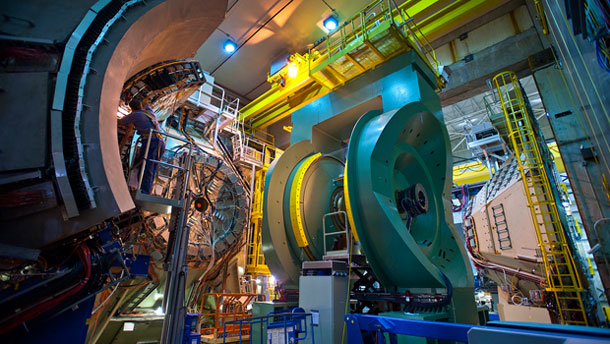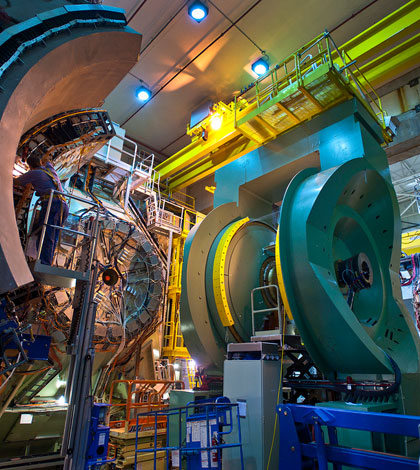
Physicists exploring the subatomic realm are well aware of the uncertainty principle at work on the particles there but now a federal report has come out that casts the future of America’s most advanced physics experiments in doubt at the Brookhaven National Laboratory’s Relativistic Heavy Ion Collider (RHIC).
The issue, as it is with many things involving the federal government these days, involves funding. But more importantly what’s at stake is the United States’ ability to remain at the forefront of cutting-edge science.
Last week a report was released by a subpanel of the Department of Energy and the National Science Foundation’s Nuclear Science Advisory Committee that recommended closing the heavy ion collider if federal funding remains flat or just keeps up with inflation in the coming years. The report, named after the subpanel’s chairman Robert Tribble, a nuclear physicist based at the Cyclotron Institute at Texas A&M University, favored completing a facility now under construction at Michigan State University and maintaining another facility at the Jefferson Lab in Virginia, which is being upgraded.
A modest increase more than inflation, the report suggested, might keep all facilities at least on track. Of America’s the three large atomic research labs, only BNL’s RHIC is currently operating, and it is set to run a series of high-level experiments starting Feb. 11 that will last until the summer.
In Monday’s response to the report’s worst-case scenario, the Empire State’s Congressional representatives have begun to weigh in. Both New York’s Democratic Senators, Charles Schumer and Kirsten Gillibrand, have called on the Office of Management and Budget and the Department of Energy to increase funding of its nuclear physics program by an additional $50 million for the next fiscal year.
“Even though this report is non-binding, it should serve as a call to arms for those who care about scientific research, Long Island’s economy, and our nation’s position at the forefront of innovation,” said Sen. Charles Schumer (D-NY). “The solution to the problem is simply to make sure that the budget for nuclear research in this country is given a modest boost, so that hundreds of jobs on Long Island are preserved and America remains at the cutting edge of nuclear research. Cutting our nuclear research now, and ceding our advantage to our competitors, is penny wise and pound foolish.”
“Closing a facility that plays an important role in the future of U.S. competitiveness and supports hundreds of jobs is the wrong approach,” said Sen. Kirsten Gillibrand (D-NY). “If we are going to out-innovate and out-compete other countries in the fields of science and technology, we must continue to invest in cutting edge facilities like the country’s only ion collider at Brookhaven National Lab.”
In a jointly authored letter to the outgoing Secretary of Energy Steven Chu and acting director of the Office of Management and Budget Jeffrey Zients, the senators wrote: “Now is not the time to scale back federal funding for such critical basic research and important scientific facilities and cede our position of leadership in these fields of study. Our economic competitors in China, India and other countries have seen our success in these areas and now copy our approach to innovation and are increasing their rate of investment at a time when we seem to be considering the opposite.
“Strengthening U.S. investment in nuclear physics is the right thing to do to develop technologies to improve national security, identify and cure disease and meet our energy challenges, as well as to expand our knowledge about the makeup of the universe through scientific discovery. Americans stand to benefit today and in the future from U.S. investment in nuclear physics through better medical imaging and diagnostic tools, new cancer therapies, advanced tools to deter nuclear proliferation and innovative energy storage systems.”
Rep. Tim Bishop (D-Southampton) has been working closely with the offices of both senators to coordinate a response, and together they reversed deep cuts Republicans in Congress had proposed in spending bills in the past. They hope to do the same this time around, too.
“I have fought successfully in the past to protect Brookhaven National Lab from damaging budget cuts that would hurt Long Island’s economy and threaten America’s international leadership in research and development,” said Rep. Tim Bishop. “I am coordinating closely with Lab officials and Senators Schumer and Gillibrand to make the case that the cutting-edge research in energy, medicine and other fields performed at the RHIC is a national priority that deserves sustained funding.”
The RHIC is world-renown for its ability to recreate the conditions presumed to match the universe in the first moments of existence so scientists can study in detail the type of matter at the beginning and understand the force that holds together “the fundamental particles that make up 99 percent” of the visible world—from stars to planets to people.
“We believe that RHIC science, past and future, is compelling and essential both for the DOE mission as well as for U.S. leadership in nuclear physics — and the Tribble report strongly reflects that view,” says Doon Gibbs, BNL’s interim laboratory director. “We will continue to advocate for science, for RHIC, and for Brookhaven Lab in all that we do.”
In a statement on the lab’s website, Gibbs said that he’s been in touch with the other two labs’ directors and “we have agreed to work together to realize the modest growth path.”



































